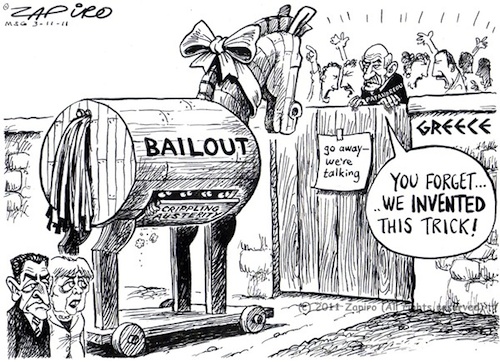Greece’s European creditors are playing a game of pass-the-parcel about who should stump up the money to avert a default at the end of June if Athens clinches a last-gasp deal this week on a package of reforms to unlock frozen bailout funds.
Greece must repay the International Monetary Fund (IMF) 1.6 billion euros ($1.8 billion) by June 30 or be declared in default, potentially triggering capital controls to prevent a bank run and pushing it closer to an exit from the euro zone.
However, euro zone governments say it is already too late to release the 7.2 billion euros left in Greece’s bailout before the end of the month, since national parliaments would only approve the disbursement once the Greeks pass laws to enact their reform promises – a process known as “prior actions”.
Another possible source of quick funds would be for the European Central Bank to let the Greek government sell more short-term Treasury bills to Greek banks and others. Greek Prime Minister Alexis Tsipras has repeatedly appealed to ECB President Mario Draghi to loosen the noose on Greece in this way.
But Draghi, facing strong opposition from hawks in Germany’s Bundesbank and its allies on the ECB governing council, has said the bank would only allow more T-bill issuance once it was sure the member states would disburse the frozen aid.
That, too, would come too late for the June 30 deadline.
That leaves two other pots of money that could be used to give Greece a lifeline to repay the IMF: 1.9 billion euros in profits from ECB holdings of Greek government bonds bought in 2010-11, which were returned to euro zone member states; or 10.9 billion euros in loans earmarked for recapitalising Greek banks, which are being held by the euro zone rescue fund.
Either of those sums could be released by a unanimous agreement of the Eurogroup of euro zone finance ministers without prior parliamentary authorisation, EU sources said.
In theory, the transfer of the 2014 SMP profits is conditional on the conclusion of the bailout review, certified by all three lending institutions – IMF, ECB and European Commission – and the approval of the Eurogroup.
As for the HFSF money, it was made subject to a request by the ECB and its banking supervisory arm.
EU officials say some of that amount could be released after Greece completes the “prior actions”, proving its willingness to turn reform promises into legislation.
That would give Athens money to redeem some 6.9 billion euros in bonds held by the ECB that mature in July and August.

